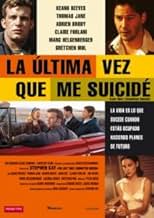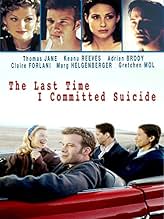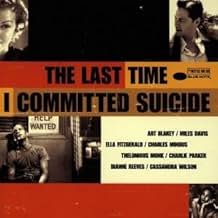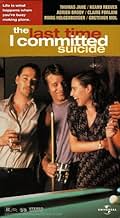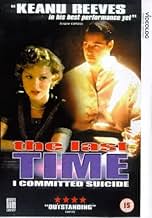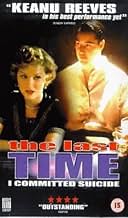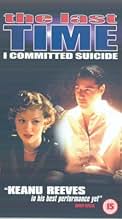IMDb RATING
5.4/10
2.6K
YOUR RATING
In 1946 Denver, an aspiring writer who enjoys irresponsible adventures with his friend writes a letter about his life before and after the suicide attempt by his sad, commitment-seeking girl... Read allIn 1946 Denver, an aspiring writer who enjoys irresponsible adventures with his friend writes a letter about his life before and after the suicide attempt by his sad, commitment-seeking girlfriend.In 1946 Denver, an aspiring writer who enjoys irresponsible adventures with his friend writes a letter about his life before and after the suicide attempt by his sad, commitment-seeking girlfriend.
Cristine Rose
- Mrs. Greenway
- (as Christine Rose)
- Director
- Writers
- All cast & crew
- Production, box office & more at IMDbPro
Featured reviews
To appreciate this film the viewer needs either to be in a jazzy, rebellious sort of mood, or have some interest in Neal Cassady, an American who figured heavily in the development of the "beat generation" of the 1950s.
Set in the 1940s during one notable period of Cassady's life, the film is mostly a character study of Cassady (Thomas Jane), and his relationship with other people in his life, including his friend Harry (Keanu Reeves) and various romantic interests, the central one being Joan (Claire Forlani).
But Cassady was a quirky kind of guy, a rebel, a nonconformist, fun loving, with a restless energy, a person constantly on the move, both physically and philosophically. As presented in the film, he is a cross between James Dean and Jim Morrison.
Cassady's offbeat personality is mirrored in the film's offbeat style. It's shot partly in color and partly in B&W. Plot structure seems deliberately chaotic, frenetic, loose. Jump cuts can be jarring for viewers expecting a smoothly flowing, linear plot. And the tone alternates between silly and philosophical. Background music is mostly jazz with some blues thrown in. Accordingly, a lot of viewers will find the film's unorthodox style off-putting.
But I liked it, for the most part. The plot would have been stronger if it had focused on Cassady's 1950s relationship with other historical figures, like Jack Kerouac and Allen Ginsberg, instead of his romances with random women. Otherwise, the cinematography, the music, and the performance of Thomas Jane are terrific.
Set in the 1940s during one notable period of Cassady's life, the film is mostly a character study of Cassady (Thomas Jane), and his relationship with other people in his life, including his friend Harry (Keanu Reeves) and various romantic interests, the central one being Joan (Claire Forlani).
But Cassady was a quirky kind of guy, a rebel, a nonconformist, fun loving, with a restless energy, a person constantly on the move, both physically and philosophically. As presented in the film, he is a cross between James Dean and Jim Morrison.
Cassady's offbeat personality is mirrored in the film's offbeat style. It's shot partly in color and partly in B&W. Plot structure seems deliberately chaotic, frenetic, loose. Jump cuts can be jarring for viewers expecting a smoothly flowing, linear plot. And the tone alternates between silly and philosophical. Background music is mostly jazz with some blues thrown in. Accordingly, a lot of viewers will find the film's unorthodox style off-putting.
But I liked it, for the most part. The plot would have been stronger if it had focused on Cassady's 1950s relationship with other historical figures, like Jack Kerouac and Allen Ginsberg, instead of his romances with random women. Otherwise, the cinematography, the music, and the performance of Thomas Jane are terrific.
You know, normally when you have a good script and excellent
actors on your project, you can turn out something decent, good or
great...even when you, as the director, believe you're talented and
think you know what you're doing. But so far as "The Last Time I
Committed Suicide" is concerned, Stephen T. Kay flat out ruined
this movie, and it is damn near unforgivable.
Here we have a screenplay filled with some of the most wonderful
dialog you can imagine being delivered by a troupe of wonderful
actors. Thomas Jane gives a star making turn as Neal Cassady,
and he is backed up with a startlingly naturalistic and cozy turn by
Keanu Reeves as his drunk buddy, Harry. But could you enjoy the
beautiful rhythm of their work? Noooooooooo. By God, Mr. Kay
was going to remind you every step of the way that he is
DIRECTING this film and you are going to pay attention to that fact,
come hell or high water.
I mean, here we have a quiet intense drama about a charismatic
man who inspired people like Jack Kerouac and Alan Ginsberg,
and the director uses every trick in "The MTV Bible of Pseudo
Filmography" to hide that fact and (supposedly) make it palatable
for the ADD generation. You got your jump cuts and edits every .9
seconds and odd angles and pretty inserts and on and on and on
until I finally wanted to scream at the screen, "Take a F*****G
valium!" Drama has to unfold; it cannot be force fed down your
gullet because the man making the movie thinks you're too easily
distracted to give a damn about the characters.
I've only seen one other movie where the director completely
destroyed a wonderful script -- "A Chorus of Disapproval"
(although if "While You Were Sleeping" had had any other actress
in the lead besides Sandra Bullock, it would also fit in this cursed
category).
So...if you like your drama spit out in food fight fashion, then this is
the movie for you. But if you want anything approaching reality,
check out something like "La Dolce Vita" by Federico Fellini, who
has more style in his right pinkie than in all of Stephen T. Kay's
body.
actors on your project, you can turn out something decent, good or
great...even when you, as the director, believe you're talented and
think you know what you're doing. But so far as "The Last Time I
Committed Suicide" is concerned, Stephen T. Kay flat out ruined
this movie, and it is damn near unforgivable.
Here we have a screenplay filled with some of the most wonderful
dialog you can imagine being delivered by a troupe of wonderful
actors. Thomas Jane gives a star making turn as Neal Cassady,
and he is backed up with a startlingly naturalistic and cozy turn by
Keanu Reeves as his drunk buddy, Harry. But could you enjoy the
beautiful rhythm of their work? Noooooooooo. By God, Mr. Kay
was going to remind you every step of the way that he is
DIRECTING this film and you are going to pay attention to that fact,
come hell or high water.
I mean, here we have a quiet intense drama about a charismatic
man who inspired people like Jack Kerouac and Alan Ginsberg,
and the director uses every trick in "The MTV Bible of Pseudo
Filmography" to hide that fact and (supposedly) make it palatable
for the ADD generation. You got your jump cuts and edits every .9
seconds and odd angles and pretty inserts and on and on and on
until I finally wanted to scream at the screen, "Take a F*****G
valium!" Drama has to unfold; it cannot be force fed down your
gullet because the man making the movie thinks you're too easily
distracted to give a damn about the characters.
I've only seen one other movie where the director completely
destroyed a wonderful script -- "A Chorus of Disapproval"
(although if "While You Were Sleeping" had had any other actress
in the lead besides Sandra Bullock, it would also fit in this cursed
category).
So...if you like your drama spit out in food fight fashion, then this is
the movie for you. But if you want anything approaching reality,
check out something like "La Dolce Vita" by Federico Fellini, who
has more style in his right pinkie than in all of Stephen T. Kay's
body.
This is an excellent film which really captures the feeling and atmosphere of the Beat Generation. The film is based around a letter Neal Cassady (seen as Dean Moriarty in Jack Kerouac's seminal 'On The Road') wrote to Jack Kerouac about his 16 year old girl friend Cherry Mary. I won't go into anymore details as I think the less you know about a film before seeing it the better - but suffice to say that if you have any interest in the beat generation, or enjoyed any of Kerouacs books you'll like this film. Cinematography and music are both also exceptional.
Seeing this film for the first time is like being introduced to that friend or lover you always dreamed about. Neal Cassady, the hero of Jack Kerouac's On The Road and Visions Of Cody, comes to life on the screen, having the same effect as James Dean used to; as the old cliche goes: women want him, men want to be him. Taken from a letter Cassady wrote to good ol' Jack, the story meanders around the lives of Cassady, his pool hall boozer friend Harry, and his lovely but melancholy girlfriend Joan (played exquisitely by Claire Forlani, who is in my humble opinion one of the most beautiful and gifted people working in Hollywood today). So, not to give too much of the plot away, Neal manages to have his decisions made for him; whether this is by fate or by his own personality is left up to the viewer. Stephen Kay follows Cassady and recreates a legend before our eyes. And whoever discovered Thomas Jane deserves a big ol' kiss. The film delivers, and the spirit of the Beats once again is given a voice and, as it were, an image.
10Jonell
This movie was amazing...Thomas Jane was terrific..Claire Forlani, Gretchen Mol..BUT..the one who stole the film...was KEANU REEVES..he should be VERY proud of the job he did in this film. He *was* Harry...was not afraid to put on the extra pounds for the role..he looked like a loser barfly.. a very lovable one..This was a very overlooked film..that many people have not had the privilege to see...If you want to see Keanu Reeves ACT..see this film..Stephen Kay did a wonderful job..he captured the spirit of the time in the language and the cinematography.
Did you know
- TriviaThe letter on which this movie is based was referred to by its author Neal Cassady, and its recipient Jack Kerouac as "the Joan Anderson letter" (even though the only extant fragment more prominently and dramatically dealt with a different girlfriend of Neal's at the time, nicknamed Cherry Mary). This letter, written in December 1950 about events in Cassady's life from the summer through Christmas of 1945, was "lost" circa 1954 and 1955. But before that happened, a 5,000-word fragment (on which this movie is based) had been copied (retyped) likely by Kerouac himself, and was subsequently published in 1964 in a small San Francisco literary magazine called "Notes From Underground", then again later in Cassady's posthumous autobiography "The First Third" (beginning "To have seen a specter isn't everything ..."). The entire 16,000-word letter by Cassady - which Kerouac had praised as a turning point in his approach to writing - was never seen again after 1955 - and consequently became something of a Holy Grail in the Beat world. Miraculously, in 2012, the entire letter was found after nearly sixty years in old boxes that had been stored since being rescued from the Sausalito publisher Golden Goose's garbage when it folded in 1955. It's set for auction on December 17, 2014.
- GoofsDianne Reeves wasn't born until 1956 but her "Jingle Bells" is used in the soundtrack.
- Quotes
Neal Cassady: One startled look and I knew, I was right back where I'd started.
- Crazy creditsThe film is introduced with these sentences:
A man's life is merely a collection of events, building one upon the other. When all the events are tallied: the triumphs; the failures; the mistakes, their sum makes up the man.
These are but a few events in the life of "Superman".
- SoundtracksBetter Get It in Your Soul
Written by Charles Mingus
Performed by Charles Mingus
Courtesy of Columbia Records
Details
- Release date
- Country of origin
- Language
- Also known as
- The Last Time I Committed Suicide
- Filming locations
- Production companies
- See more company credits at IMDbPro
Box office
- Budget
- $4,000,000 (estimated)
- Gross US & Canada
- $46,362
- Opening weekend US & Canada
- $12,836
- Jun 22, 1997
- Gross worldwide
- $46,362
- Runtime
- 1h 32m(92 min)
- Color
- Sound mix
- Aspect ratio
- 1.85 : 1
Contribute to this page
Suggest an edit or add missing content


